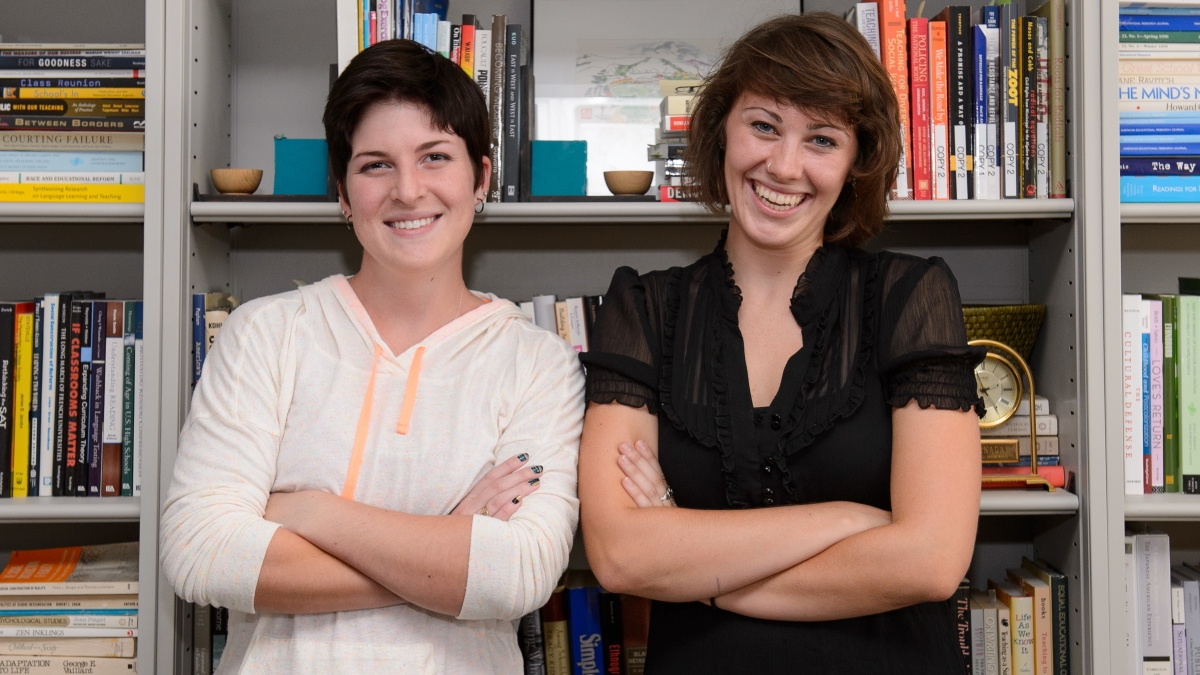ASU undergrads study domestic violence as paid researchers, honors scholars

The Centers for Disease Control and Prevention reports that at least one in four women and one in seven men in the United States have been the victim of severe physical violence by an intimate partner in their lifetime. As a public health issue, intimate partner violence costs this nation an estimated $5.8 billion each year in direct medical and mental health care costs, and lost productivity and earnings.
“If these numbers were attributed to disease, gang violence or terrorism, we as a society would not be so complacent,” observes ASU senior Kimberley Hutchinson. (Watch the informational video Hutchinson created for an ASU panel as part of the month-long Paint Phoenix Purple domestic violence awareness campaign.)
Hutchinson is one of two School of Social Transformation undergraduates working in paid research assistantships on the National Science Foundation-funded project, “Legal Mobilization and Intimate Partner Victimization.” Hutchinson and Shannon Jenkins, both women and gender studies majors, are working under the direction of Alesha Durfee, associate professor of women and gender studies and co-principal investigator on the project (with Jill Theresa Messing from the School of Social Work).
Professors Durfee and Messing received a $193,996 award to explore why some survivors of intimate partner violence in Arizona file for domestic violence civil protection orders. The study involves 700 surveys and 123 interviews with women in Arizona shelters and the advocates who work with them. The researchers are studying how domestic violence survivors and advocates view the role of the legal system in regard to abuse. The project results will address gaps in the literature on legal mobilization, legal consciousness, help-seeking behaviors of victims and inequalities in access to justice.
Jenkins, a senior from Mississippi, has been working on the project with professors Durfee and Messing for a year now. Hutchinson, from Tucson, joined the project in August.
“In the first few months I was trained to conduct interviews,” Jenkins says. “As a research team, we composed the interview questions and practiced using the recorders, listening attentively and getting the information we needed in a respectful way. In late spring and summer I had the privilege of conducting 28 of our 100 survivor interviews for the project.”
Last fall the team prepped transcripts, notes and audio files, and began the careful task of coding interviews.
Both Jenkins and Hutchinson are using some of the project data as the basis of their honors’ theses.
“I'm looking at a subset of the interviews I conducted that speak to how survivors construct themselves as mothers, how motherhood shapes their help-seeking behaviors and what barriers mothers face when seeking help,” Jenkins explains. “I'll also be looking at how the survivors of my subset consistently construct their abusive partners as ‘good fathers,’ and the role of substance abuse in these relationships.”
Hutchinson is also addressing the experience of mothers. She’s examining the survey results from participants who have children to see “if they tended to experience violence of a different type, frequency or severity than women without children, and if their help-seeking practices differ – such as seeking an order of protection, calling the police or temporarily or permanently leaving the relationship,” she explains. “I’ll also be analyzing recent political discussions about intimate partner violence and mothers in abusive relationships, trying to discern underlying societal attitudes about how women with children are expected to act within an abusive relationship.”
When they leave ASU in May, both women are passionate about continuing to work to break the cycle of domestic violence and the silence that surrounds it.
Jenkins would like to stay in Arizona to do advocacy work with survivors: “perhaps working directly out of a shelter or as a first-responder out of a police station, or maybe working with the Arizona Coalition Against Domestic Violence and Sexual Assault.”
Hutchinson hopes to work either as a volunteer or as a legal advocate at a Tucson-area women's shelter, getting some hands-on experience working with survivors while exploring law school.
Professor Durfee has arranged for Jenkins and Hutchinson to attend the Converge! conference at the University of Miami in February. The trip was funded through the National Science Foundation's Research Opportunities for Undergraduates (REU) program.
“This is a leading-edge conference that brings together domestic violence survivors, activists and academics to discuss strategies and recommendations for change,” says Durfee, who is an invited presenter. “The conference is about re-imagining criminal justice alternatives to address this crippling social issue, and I know that Kim and Shannon are excited to be part of contributing to that change."
The School of Social Transformation is an academic unit in the College of Liberal Arts and Sciences.